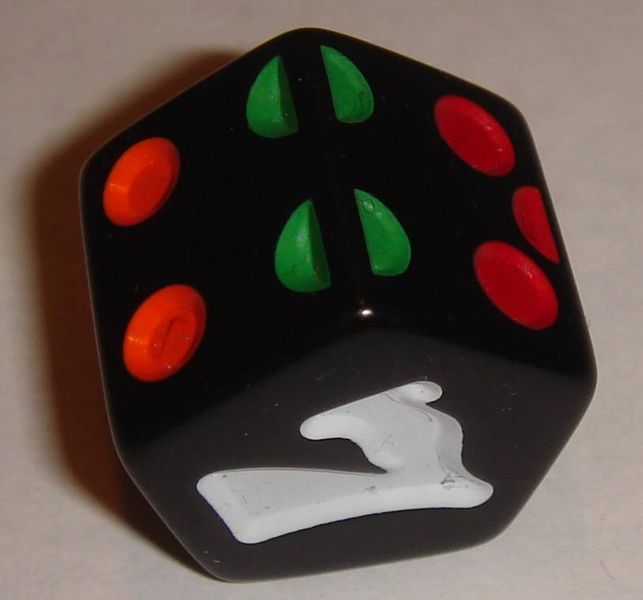Dice sums 2
 Say now that we have 4 distinct dice each with 7 faces labelled
1
,
2
,
3
,
4
,
5
,
6
,
7
, and I roll all 4 simultaneously. Again let
d
1
be the number that comes up on the first dice,
d
2
be the number that comes up on the second dice,
d
3
be the number that comes up on the third dice and
d
4
be the number that comes up on the fourth dice. In how many ways can I roll the 4 dice in this way so that 3 divides
d
1
+
d
2
+
d
3
+
d
4
?
Say now that we have 4 distinct dice each with 7 faces labelled
1
,
2
,
3
,
4
,
5
,
6
,
7
, and I roll all 4 simultaneously. Again let
d
1
be the number that comes up on the first dice,
d
2
be the number that comes up on the second dice,
d
3
be the number that comes up on the third dice and
d
4
be the number that comes up on the fourth dice. In how many ways can I roll the 4 dice in this way so that 3 divides
d
1
+
d
2
+
d
3
+
d
4
?
For the easier version, see dice sums 1 .
Image credit: Wikipedia Traitor
The answer is 800.
This section requires Javascript.
You are seeing this because something didn't load right. We suggest you, (a) try
refreshing the page, (b) enabling javascript if it is disabled on your browser and,
finally, (c)
loading the
non-javascript version of this page
. We're sorry about the hassle.
5 solutions
suck myself... - - i forgot the 1 1 2 2 case - -
If the fourth roll is not 7, for any result of the first three dice there's exactly 3 1 probability for the fourth dice so the sum is divisible by 3. Otherwise, the fourth roll is 7.
If the third roll is not 7, for any result of the first two dice combined with the fourth roll's 7, there's exactly 3 1 probability for the third dice so the sum is divisible by 3. Otherwise, the third roll is 7.
Use the same reasoning for the second and the first dice. This way, we have shown that there's exactly 3 1 probability for the sum to be divisible by 3 as long as not all dice show 7. This means out of 7 4 − 1 = 2 4 0 0 possibilities, 3 1 of them give a sum divisible by 3 , or in other words 8 0 0 cases. The last case, all sevens, is not a desired case, so the total is 8 0 0 cases.
The total number of outcomes is equal to 7 4 . Applying a general principle, it is known that 3 1 of all numbers is divisible by 3 . Of all the outcomes, the sums obtained which are divisible by 3 can be expressed as 3 7 4 , rounded down.
This is 3 2 4 0 1 = 8 0 0 . 3 3 . . . , which is approximately 8 0 0
While 1/3 of all integers are divisible by 3, all integers are not equally represented here. You happened to get the right answer, but this is not a solution.
In fact, it's easy to see why your reasoning cannot be correct: use your method to find the answer if the total must be congruent mod 3 to 1, then to 2. You will get 800 for all three. So the probability of it having any result at all is 2400/2401.
OMG same solution. xD By the power of simplicity! Hi-five! Though yeah I think our solution is a bit messed up somehow, though I can't understand the big words with big solutions of the solution on top. xD No offense, Mr. Kevin.
Here's a very direct method. Expand ( x + . . . + x 7 ) 4 = x 2 8 + 4 x 2 7 + 1 0 x 2 6 + 2 0 x 2 5 + 3 5 x 2 4 + 5 6 x 2 3 + 8 4 x 2 2 + 1 1 6 x 2 1 + 1 4 9 x 2 0 + 1 8 0 x 1 9 + 2 0 6 x 1 8 + 2 2 4 x 1 7 + 2 3 1 x 1 6 + 2 2 4 x 1 5 + 2 0 6 x 1 4 + 1 8 0 x 1 3 + 1 4 9 x 1 2 + 1 1 6 x 1 1 + 8 4 x 1 0 + 5 6 x 9 + 3 5 x 8 + 2 0 x 7 + 1 0 x 6 + 4 x 5 + x 4 using computer algebra and add up the coefficients of the powers 6,9,...,27 to get 4 + 3 5 + 1 1 6 + 2 0 6 + 2 2 4 + 1 4 9 + 5 6 + 1 0 = 8 0 0 .
Easy. 1/3 of the numbers is a multiple of 3, so 7x7x7x7 is 2401, then divided by 3 is 800.33. Since it has to be a whole number, it only becomes 800.
:D
Consider the values rolled, mod 3. For each die there are two ways to roll a 0 or 2, and three ways to roll a 1.
Only the following configurations sum to 0:
Summing these gives 800, our answer.